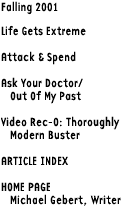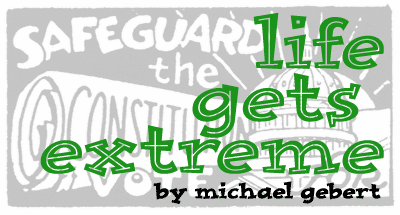


With timing second only to Arnold Schwarzenegger’s, I had written a piece for this issue about how the ad market slump was an overreaction to the dot com bust—because nothing had really changed in rich, fat, deliriously comfy America. I’d even already printed the envelopes for the mailed version, with a cheerful headline ("This is the best possible time") that now looks ghastly. And then things did change—giving us at last both our little industry’s decline and the big event to justify it. Edinburgh Man Lost In Ad Slump.
In fact, I’m not at all certain that I wasn’t right about nothing changing economically. News footage of Afghanistan has certainly driven home the point that by any historical standard, even in recession America will merely decline from Fabulously to Enormously Wealthy. But I do think things will change in the culture, of which advertising is so much a part now.
The 90s (which ended September 11) were both a golden and a gilded age. We had nostalgia for World War II because the idea of fighting for, of being deprived of anything seemed impossibly remote. We devoured hyped-up, manufactured “reality TV” (both the Survivor kind and the O.J.-Monica-Chandra kind) because our actual reality was so tame.
War ends all that. And certain 90s forms of outrageously excessive consumption will plainly go out of fashion, as selfish. It will be interesting, then, to see how advertising reacts if there’s a genuine move to make do with less for the common good. Can we as an industry figure out how to talk measured, rather than maximum, consumption? (We did it during WWII—though not Vietnam—but the public is several orders more cynical than in the days when a cigarette, forced to change its packaging because the inks contained vital chemicals, could hype the fact with a straight face as “Lucky Strike Green Has Gone To War!”)
If excessive comfort goes out of fashion, so will its flip side, the “extreme” attitude. With life having become so safe, all airbags and warning labels, we had to seek the rush of danger in fantasies of freefall snowboarding with a soft drink; we demonstrated badass street cred in our choice of walking shoes and copped a ‘tude by seeking out ever-edgier breath mints. Well, Osama bin Laden is even more extreme than Mountain Dew. And whatever the new ‘tude of the times turns out to be, it won’t be as careless and carefree as that.

Go to Attack & Spend (the piece originally intended to lead this issue)